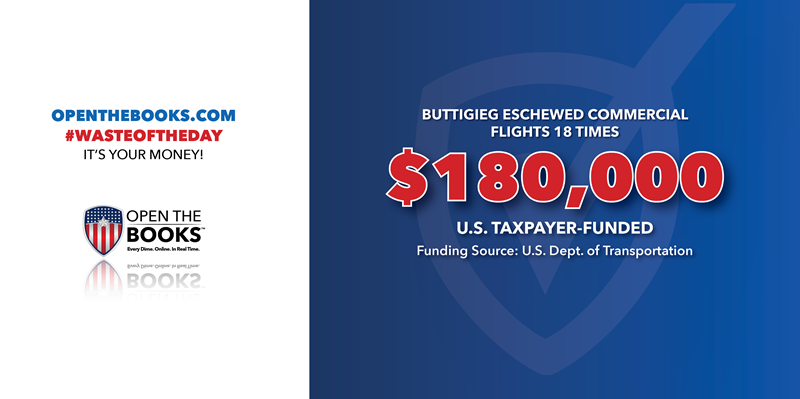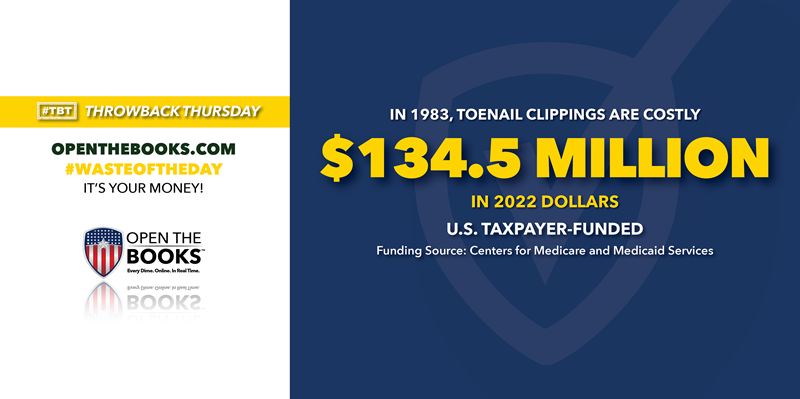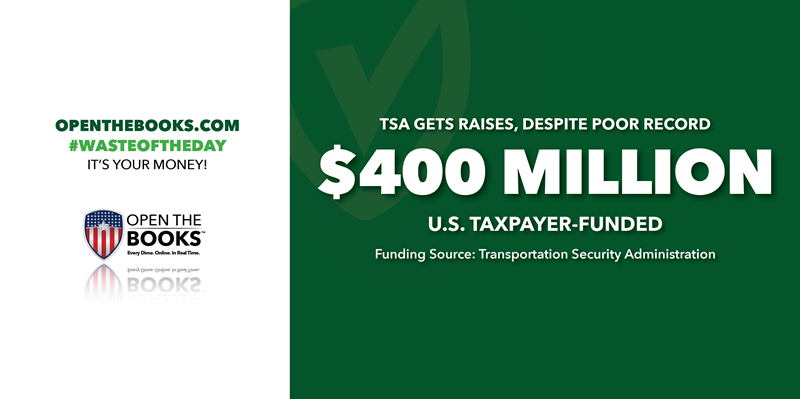
Buttigieg Flew in Private Jets 18 Times, Costing Approx. $180K
January 23, 2023

Secretary of Transportation Pete Buttigieg has flown on the taxpayer’s dime on private jets 18 times since taking office in January 2021, according to a report by The New York Post.
The report found Buttigieg flew to Nevada, Florida, Oklahoma, Minnesota, Ohio, New Hampshire, and Montreal on various trips using two Cessna 560XL jets managed by the Federal Aviation Administration, according to flight tracking data obtained by watchdog group Americans for Public Trust.
While the cost of the flights was not publicly reported, The Washington Post has reported that jets like these often cost around $5,000/hour. Assuming each flight took an average of two hours, Buttigieg’s 18 flights would cost approximately $180,000.
Former cabinet members have also faced scrutiny for private jet usage in 2017. Former Secretary of Transportation Elaine Chao cost taxpayers about $94,000 for seven trips, and Secretary of Health and Human Services Tom Price cost taxpayers $1.2 million for 26 trips.
Buttigieg is not only showing a reckless disregard for taxpayers’ money but is also contradicting his stances on green energy. While he publicly espouses electric vehicles and public transportation to curb climate change, he’s been flying in gas guzzling private jets.
Buttigieg has defended his trips, with a spokesperson saying that most of his travel is by commercial airplanes, adding that, “there are some cases where it is more efficient and/or less expensive for the secretary and accompanying personnel to fly on a 9-seater FAA plane rather than commercial flights,” according to The Post.
DoD had $292M in Questioned Costs in 2022
January 24, 2023

A 2022 audit of the Department of Defense found the agency had $292.2 million in questioned costs, with an additional $26.6 million in funds that could have been put to better use.
The DoD was audited by the DoD Office of Inspector General, in partnership with RMA Associates, an independent accounting firm. The report found that while the DoD did present its financials fairly and accurately, there were numerous questioned costs.
Questioned costs are those that are in violation or possible violation of funding regulations, may not have adequate documentation, or may appear to be unreasonable.
Funds that could have been put to better use are exactly what they sound like: funds that could have been allocated toward paying military members, purchasing equipment, or other necessary expenses.
These questioned costs are likely a result of inadequate internal controls, according to the audit.
Auditors emphasized that the DoD lacked a uniform financial policy, calling the current process “fragmented and decentralized.” They also found that additional progress is needed to implement controls, and that a lack of availability and cooperation from agency officials caused delays in the auditing process.
The report found that the agency also didn’t have policies in place to document the process for mitigating control deficiencies, nor did it have compliant technical, editorial, or consistency reviews.
The DoD is one of the largest federal agencies, making up 12.6% of the federal budget, with $1 trillion in budgetary resources in FY 2023. It is concerning that an agency of this size is struggling with basic accounting controls.
The DOD received a 4% increase in its budget for 2023. Hopefully, the agency can get its act together and implement basic accounting controls to prevent hundreds of millions in future questioned costs.
Columbia University Receives $3M to Address NYC Climate Issues
January 25, 2023

Among the over $16 billion worth of earmarks included in the $1.7 trillion omnibus spending bill, New York Congressman Jerry Nadler gave Columbia University almost $3 million to address climate change, despite the Ivy League university’s endowment growing to $13.3 billion.
Earmarks are special funding mechanisms that allow federal lawmakers to designate money for local projects in their states or districts. Dubbed “the currency of corruption,” earmarks were once banned but legislators voted to bring them back in 2021.
The grant is for the purpose of “addressing climate challenges to agriculture and water quality in the New York City watershed.” While this may be a laudable goal, there are two problems.
First, Columbia University is one of the richest institutions in the world, with an endowment of $13.3 billion, while it charges students $65,000 in annual tuition. It also pays no taxes because of its nonprofit status.
This project could have been done philanthropically, subsidized by a university with a mission to serve its community. This would have given the institution's students real problem solving experience.
Second, this infrastructure project benefits New York City residents, and should be paid for by New York City residents. Local projects should receive local or state funding, and not be financed on the back of taxpayers in Oklahoma and elsewhere.
Making rich universities richer is another reason why the new Congress needs to put an end to earmarks.
Throwback Thursday: In 1983, Government Spent $45M to Clip Toenails
January 26, 2023

Throwback Thursday!
In 1983, the Health Care Financing Administration, now the Centers for Medicare and Medicaid Services, wasted $45 million — $134.5 million in 2023 dollars — by adopting a policy that allowed Medicare to foot the bill for cutting toenails.
Sen. William Proxmire, a Democrat from Wisconsin, gave the agency his Golden Fleece Award for this costly and wasteful policy.
According to Proxmire, “Medicare does not usually pay for routine footcare such as cutting toenails. But if patients have a fungus infection around that toenail, then Medicare will pay for a procedure called debridement of mycotic toenails – in other words, cutting [or removing] infected toenails.”
Proxmire cited an Inspector General report that found “significant overutilization” of this procedure, as well as “solid indications that some podiatrists … are misdiagnosing the medical condition of beneficiaries in order to obtain Medicare reimbursement for routine toenail cutting.” The report cited that these misdiagnoses cost approximately $45 million per year.
A study by the Inspector General detailed the scheme in Virginia. Podiatrists billed Medicare $791,000, with more than 70% of those cases being for debridements. This procedure should take about 15 minutes to complete, but some podiatrists billed for between 50 and 116 debridements in one day’s work, impossible to perform in a single day.
To fix this abuse, Proxmire suggested two simple solutions: limit reimbursements for debridements to once every 60 days, and require doctors to diagnose these infections, not podiatrists. Though simple, those two fixes could have saved taxpayers $45 million in 1983.
Proxmire reminds us that solutions to these problems need not be complicated in order to save taxpayer money.
TSA Receives $400M in Pay Raises
January 27, 2023

As part of the 4,000 page, $1.7 trillion omnibus bill passed last month, the Transportation Security Administration will receive $400 million to boost its employees’ salaries, according to Reason.
These pay raises are modest compared to a bill legislators tried to pass in June, which would have cost $1.6 billion and would have raised salaries across the board by about 30%.
In addition to the $400 million for pay raises, the agency has also been granted $61 million to hire more employees, and has been given the right to collectively bargain, making future pay raises even more likely.
The collective bargaining provision also increases the likelihood of security checkpoint disruptions due to future strikes. The agency specifically was not afforded collective bargaining rights when it was created because of the massive disruptions to U.S. air travel that strikes could cause.
As the Reason report notes, TSA is ineffective at its job, routinely failing to find weapons and prevent drugs from being smuggled onto aircrafts.
Regardless, the agency will receive over $10.2 billion in funding for 2023, up from $8.8 billion in 2022.
These raises are not a result of service improvements. On the contrary, a recent report from the U.S. Government Accountability Office has noted problems with discrimination in the screening process and issues with notifying passengers of the complaint process.
As most people that work in private sector jobs know, mediocrity is generally not rewarded with pay raises. Fortunately for TSA employees, and unfortunately for taxpayers, it is in the government.
The #WasteOfTheDay is presented by the forensic auditors at OpenTheBooks.com.